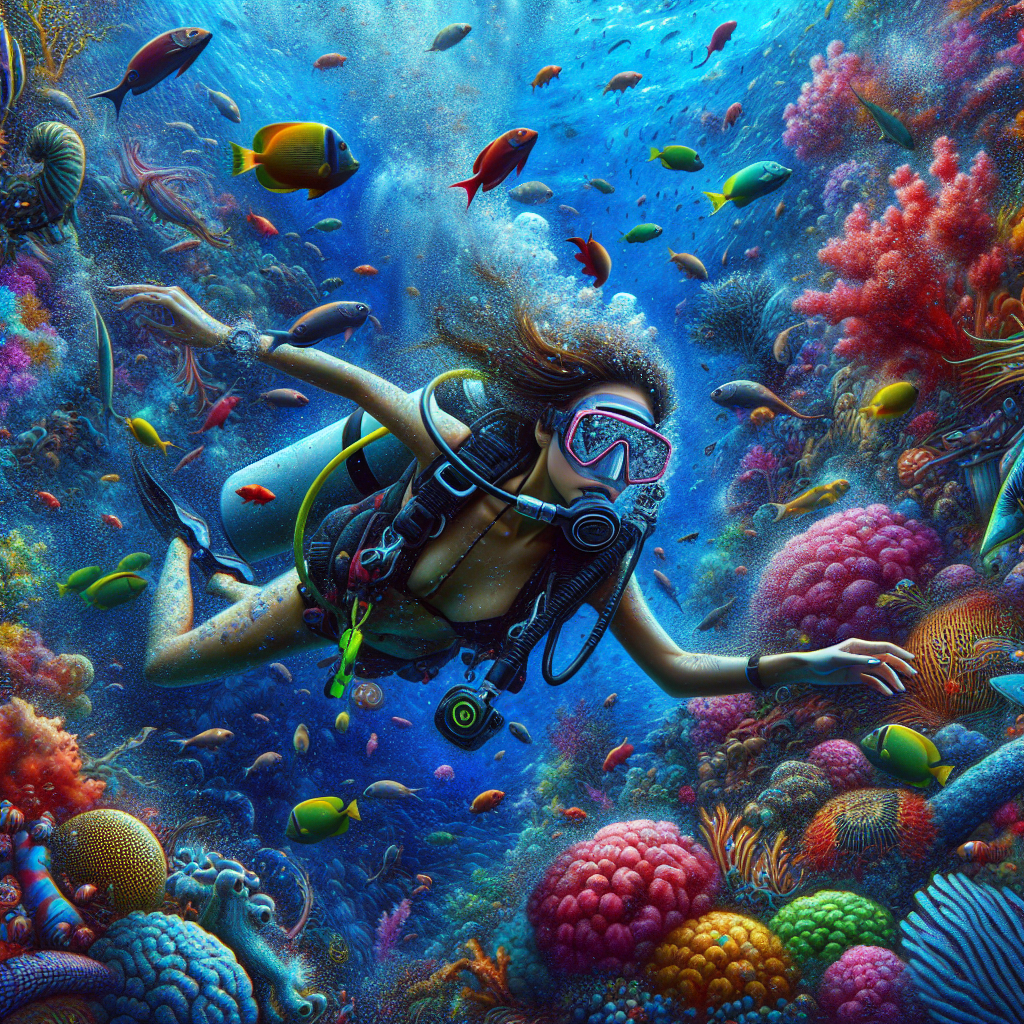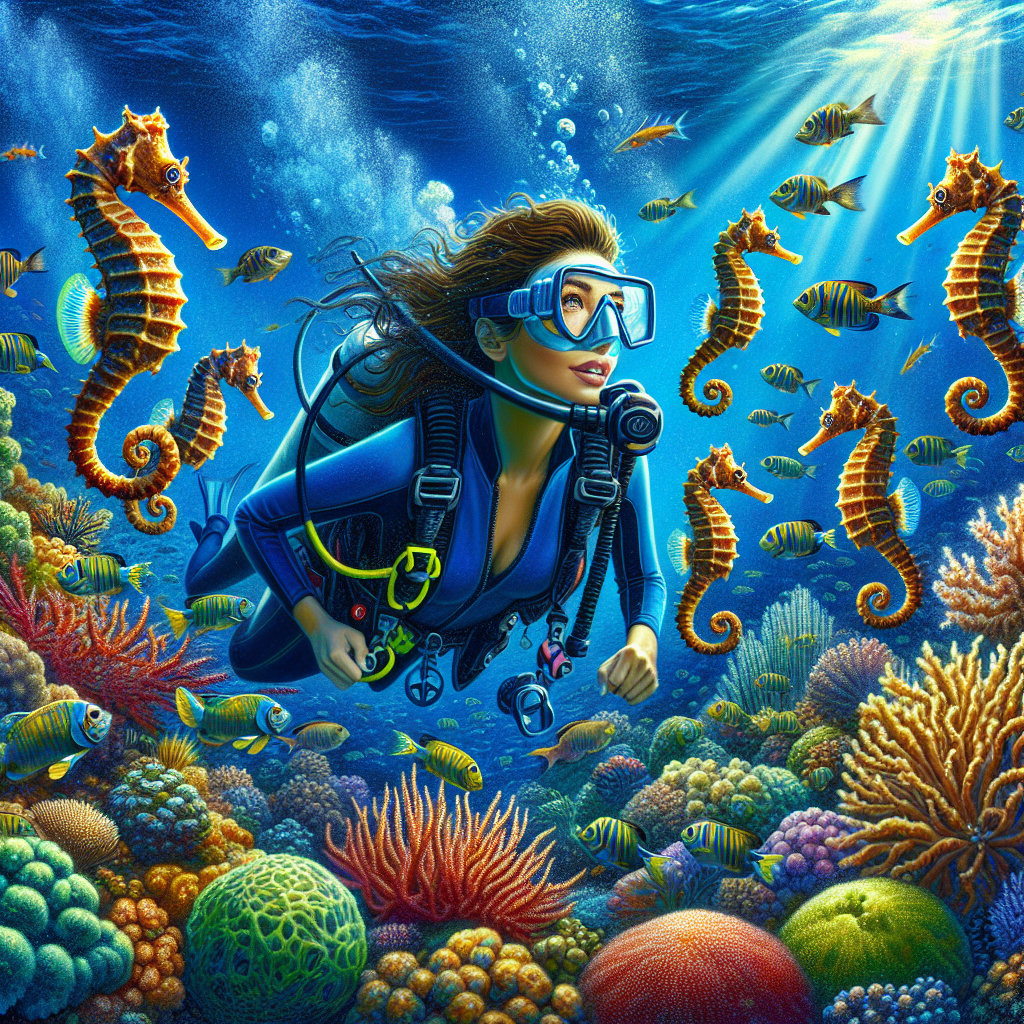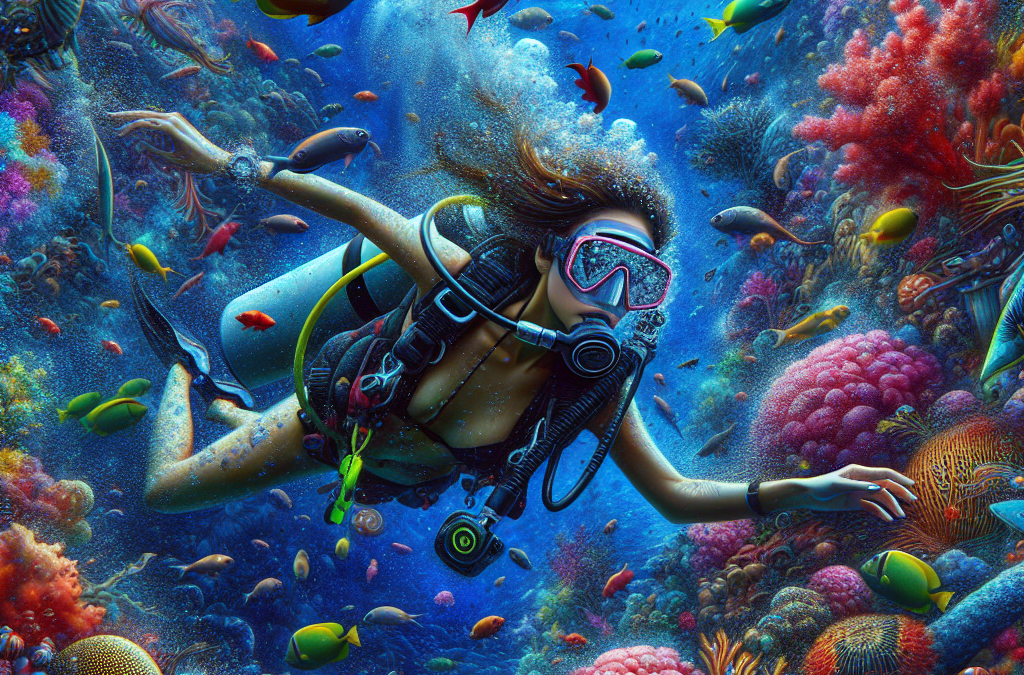Imagine donning your mask, securing your tank, and slipping beneath the surface of the water into a world of vibrant coral reefs, curious marine life, and silent, hidden treasures! Prepare to embark on a mesmerizing journey deep into the heart of our planet’s most beautiful and least explored wilderness: the ocean. “Scuba Diving Adventures: Exploring The Underwater World” serves as your tour guide to this thrilling aquatic adventure, offering a glimpse into the splendor of marine ecosystems, the excitement of diving beneath the waves and the serenity of floating weightlessly in an otherworldly landscape. This journey is both a grand adventure and an opportunity to appreciate and protect our oceans’ invaluable biodiversity. So take a deep breath, and join us as we explore the captivating underwater world!

Understanding Scuba Diving
Scuba diving is an incredible activity that affords the opportunity to explore the fascinating depths of the underwater world. As you embark on scuba diving adventures, you get to encounter marine life and ecosystems that remain hidden to those limited to the land. However, before you begin, it is important to understand the basics of scuba diving, its history, principles, and various types.
History of Scuba Diving
Scuba diving has a rich and interesting history. The concept of diving dates back centuries, with early civilizations using simple diving bell apparatus to explore underwater. It was only in the middle of the 20th century that the sport as we know it came into being, largely due to the invention of the Aqua-Lung by Jacques Cousteau and Emile Gagnan. This made underwater exploration not just possible, but accessible to a wider number of individuals.
Basic Principles of Scuba Diving
Scuba dive carries some basic principles. The first is understanding how to control buoyancy, which means managing your equipment and yourself to move up or down in the water. Second, it’s crucial to learn proper breathing. Unlike simple swimming, diving requires a continuous and relaxed breathing cycle. Lastly, you must understand and respect your limits. Every diver has different endurance levels, diving capacity and response to pressure; knowing these limitations is vital to having a safe and enjoyable dive.
Different Types of Scuba Diving
Diving offers different types and experiences. Recreational diving is the most common, performed purely for enjoyment and to observe marine life. Technical diving involves going beyond normal recreational diving limits and often requires special training and equipment. Cave diving, wreck diving, and deep diving all fall under this category. There’s also professional diving, which includes activities like underwater welding and photography, carried out for commercial purposes.
Getting Certified for Scuba Diving
Getting certified to scuba dive is not only a matter of safety, but also opens up a whole world of underwater opportunities. A certification ensures that you have the necessary skills and knowledge to conduct dives safely.
The Importance of Scuba Diving Certification
Dive certification is important, primarily for safety reasons. During certification, you learn important skills such as how to ascend safely, avoiding the serious risks of decompression illness. You are also taught how to use the dive equipment properly and handle emergencies. Apart from safety, being certified allows you to do more. For example, diving on wrecks, exploration diving, night diving, and more are all attainable after certification.
Different Certification Levels
The most common levels of certification include Open Water Diver, Advanced Open Water Diver, Rescue Diver, and Dive Master. Each level presents deeper, more challenging diving experiences, and more ways to enjoy the underwater world. Remember, the higher the certification level, the more responsibilities you have for yourself and for other divers.
How to Choose the Right Scuba Diving School
The right scuba diving school depends on various factors such as the instructors, course structure, location, and price. Always look for reputable institutions with certified instructors. The learning culture should foster safe diving and instill respect for marine life and the environment.
Basic Scuba Equipment and Its Uses
A commonly asked question by beginner divers relates to the types of equipment required. Essentially, scuba diving gear is the physical equipment needed to conduct a dive successfully and safely.
Understanding Scuba Diving Gear
The primary items of scuba diving gear include a mask, a snorkel, fins, a buoyancy control device (BCD), a scuba tank, a regulator, a dive computer, and a wetsuit. Each piece of gear has a clear purpose and contributes to the overall safety and success of each dive.
Maintenance and Care for Scuba Equipment
Proper maintenance of your scuba gear is essential to ensure it functions correctly and lasts for years. This includes cleaning it thoroughly after each use, checking for damages regularly, and having it serviced regularly by professionals.
Renting vs. Buying Scuba Equipment
Whether to rent or buy your scuba gear depends on different factors, including how frequently you dive, the cost, and storage considerations. As you progress and dive more frequently, owning your gear may become a more cost-effective and practical choice.
Preparing for a Scuba Diving Adventure
Preparation is key to a successful scuba dive. This involves both physical and mental readiness, careful planning of the dive itself, and an understanding of the safety procedures to follow.
Physical and Mental Preparation
Scuba diving is a physically demanding sport. Stamina, strength, flexibility, and good health are important. Mentally, you should be relaxed and focused.
Planning Your Dive
Planning involves choosing an appropriate dive site, checking the weather conditions, assessing potential hazards, and of course, preparing all your dive gear.
Safety Precautions and Emergency Procedures
Divers should be familiar with potential emergencies and how to deal with them, such as first aid training and rescue procedures. Always remember the golden rule of scuba diving: “Plan your dive and dive your plan.”

Exploring Different Scuba Diving Sites
As you progress in your scuba diving adventure, you’ll soon discover that every dive site offers a unique experience.
Best Scuba Diving Sites in the World
Some of the best scuba diving sites in the world include the Great Barrier Reef in Australia, the Blue Hole in Belize, and the Red Sea in Egypt, each offering a diversity of marine life and unique diving experiences.
Choosing a Scuba Diving Site
Several factors should be considered when choosing a scuba diving site. These include your diving skills, the types of marine life you want to see, the local conditions, and the specific challenges the site offers.
Famous Shipwrecks and Reefs to Explore
Exploring shipwrecks and reefs provides some of the most exciting diving experiences. Wrecks like the Titanic and the USS Oriskany in the US are popular destinations, as are stunning reefs like the Great Barrier Reef and the Maldives.
Benefits of Scuba Diving
Scuba diving is more than a thrilling adventure. It presents a range of health, mental benefits as well as aids in environmental awareness.
Health and Fitness Benefits
Scuba diving provides an excellent workout for the cardiovascular system, improving blood circulation, increasing strength and flexibility, and helping with weight management.
Mental Health Benefits
Additionally, the calm and serene underwater environment can have therapeutic effects, reducing stress, and encouraging relaxation. Known as the “blue mind” effect, this state can be compared to meditative states achieved by practices like yoga and meditation.
Environmental Awareness and Conservation
Experiencing marine ecosystems up close can increase divers’ awareness of environmental issues. It promotes an understanding of the need for conservation and respect for marine life.
Challenges and Risks in Scuba Diving
Like all sports, scuba diving has its risks. Being aware of these risks, how to avoid them, and how to deal with them if they do occur is a key part of being a responsible diver.
Common Risks and Dangers in Scuba Diving
The risks in scuba diving range from decompression illness to dangerous marine life, entrapment, and rapid changes in weather or water conditions. Proper training, strict adherence to diving practices, and careful planning can help mitigate these risks.
How to Handle Diving Emergencies
Every diver should know emergency procedures. This includes knowing how to share air, use underwater communication signals, and knowing how to perform a controlled emergency swimming ascent if necessary.
Importance of Regular Diving Practice
Regular diving practice is key to maintaining your skills and ability to react correctly under pressure. The more you dive, the more comfortable and confident you’ll be.
Scuba Diving Etiquette
Respecting the underwater environment is a significant part of being a responsible diver. This falls into three categories: respecting marine life, respecting fellow divers, and preservation of dive sites.
Respecting Marine Life
Divers should treat marine life with care and respect. Do not touch or disturb the animals, their habitats, and show admiration from a safe and respectful distance.
Respecting Other Divers
Respecting fellow divers involves following agreed dive plans, maintaining safe distances, helping when requested, and respecting their space both in and out of the water.
Preservation of Dive Sites
Dive site conservation means leaving no trace behind. Do not collect souvenirs from the sites or leave any waste behind. Remember, take only photos and leave only bubbles!
Advanced Scuba Diving Techniques
As you gain greater confidence and skill, you may wish to take up more challenging types of diving, such as deep sea, rescue, or technical and cave diving.
Deep Sea Diving
Deep-sea diving takes you beyond the limits of regular dives, allowing you to explore deeper parts of the ocean, and requires specialist training and equipment.
Rescue Diving
Rescue diving teaches divers how to manage and respond to diving emergencies and is a crucial skill for anyone looking to advance their diving capabilities.
Technical and Cave Diving
Technical and cave diving require advanced training and skill. You might explore underwater caves, or forwards into the realm of decompression diving and using mixed gases.
The Future of Scuba Diving
As with any technology-driven activity, the future of scuba diving holds great promise.
Technological Advances in Scuba Diving
From more advanced diving gear that expands our diving capabilities to virtual reality systems, the ongoing technological innovations will continue to revolutionize the scuba diving experience.
Impact of Climate Change on Scuba Diving
Climate change is drastically affecting marine ecosystems, which in turn affects the diving industry. This highlights the importance of sustainable practices in diving to help protect our oceans.
Promoting Sustainable Scuba Diving
The future of scuba diving depends on promoting and practicing sustainable scuba diving. This involves monitoring our interactions with the underwater environment, being mindful of not interrupting the natural habitat, and using eco-friendly diving gear.
As you continue your scuba diving journey, remember to always respect the environment, keep safety first, stay within your comfort zone, and most importantly, enjoy every moment spent underwater. Scuba diving truly opens up a whole new world to explore.

